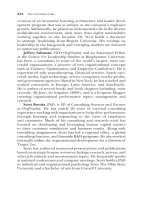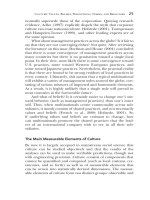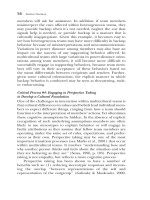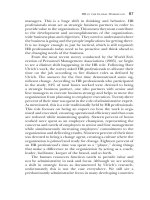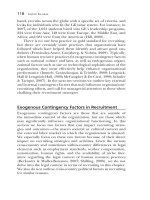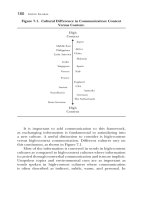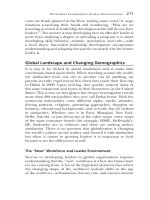Peter a nayler business law in the global marke(b ok cc)
Bạn đang xem bản rút gọn của tài liệu. Xem và tải ngay bản đầy đủ của tài liệu tại đây (1.19 MB, 272 trang )
H6005-Prelims 7/5/05 3:23 PM Page i
Business Law in the
Global Marketplace
H6005-Prelims 7/5/05 3:23 PM Page ii
H6005-Prelims 7/5/05 3:23 PM Page iii
Business Law
in the Global
Marketplace
Peter Nayler
AMSTERDAM • BOSTON • HEIDELBERG • LONDON • NEW YORK • OXFORD
PARIS • SAN DIEGO • SAN FRANCISCO • SINGAPORE • SYDNEY • TOKYO
H6005-Prelims 7/5/05 3:23 PM Page iv
Elsevier Butterworth-Heinemann
Linacre House, Jordan Hill, Oxford OX2 8DP
30 Corporate Drive, Burlington, MA 01803
First published 2006
Copyright © 2006, Peter Nayler. All rights reserved
The right of Peter Nayler to be identified as the author of this work has
been asserted in accordance with the Copyright, Designs and Patents
Act 1988
No part of this publication may be reproduced in any material form
(including photocopying or storing in any medium by electronic means
and whether or not transiently or incidentally to some other use of this
publication) without the written permission of the copyright holder except
in accordance with the provisions of the Copyright, Designs and Patents
Act 1988 or under the terms of a licence issued by the Copyright Licensing
Agency Ltd, 90 Tottenham Court Road, London, England W1T 4LP.
Applications for the copyright holder’s written permission to reproduce
any part of this publication should be addressed to the publisher
Permissions may be sought directly from Elsevier’s Science & Technology
Rights Department in Oxford, UK: phone: (ϩ44) 1865 843830, fax:
(ϩ44) 1865 853333, e-mail: You may also complete
your request on-line via the Elsevier homepage (),
by selecting ‘Customer Support’ and then ‘Obtaining Permissions’
British Library Cataloguing in Publication Data
A catalogue record for this book is available from the British Library
Library of Congress Cataloguing in Publication Data
Control Number: 2005928726
ISBN 0 7506 6005 8
For information on all Elsevier Butterworth-Heinemann
publications visit our website at www.elsevier.com
Typeset by Integra Software Services Pvt. Ltd, Pondicherry, India
www.integra-india.com
Printed and bound in Great Britain by MPG Books Ltd, Cornwall
Working together to grow
libraries in developing countries
www.elsevier.com | www.bookaid.org | www.sabre.org
H6005-Prelims 7/5/05 3:23 PM Page v
Contents
Chapter 1 The legal framework for international
business
Introduction
So what is ‘law’?
Chalk and cheese
Family ties
Civil law and common law
Distinguishing features of civil law
and common law
Other legal families
Socialist law
Religious law
1
1
5
6
7
8
9
12
13
14
Making order out of chaos – the
classification of law
The sources of law
15
24
Legislation
Case law (judicial precedent)
Academic writing
European community law
24
27
32
32
Court systems
England and Wales
The House of Lords
The Court of Appeal
The High Court of Justice
34
35
35
35
36
H6005-Prelims 7/5/05 3:23 PM Page vi
vi
Contents
The Crown Court
County Court
Magistrates’ Court
France
Tribunal d’instance
Tribunal de grande instance
Courts of special jurisdiction
Germany
Amtsgericht (local court)
Landgericht (district court)
Oberlandesgericht (appeal court)
The Bundesgerichtshof (BGH; federal court
of appeal)
Specialist federal courts of appeal
International co-operation and the
harmonisation of business law
The International Institute for the Unification
of Private Law (UNIDROIT)
The United Nations Commission on
International Trade Law (UNCITRAL)
The International Chamber of Commerce (ICC)
The World Trade Organisation (WTO)
Summary
Chapter 2 The formation of business contracts
So what is a contract?
Compliance with any required formality
Offer and acceptance
The offer
Advertisements
Goods on display in a shop
Termination of the offer
Lapse
Revocation
The acceptance
36
37
37
37
38
38
39
40
41
41
41
42
42
43
43
44
44
45
47
48
48
50
52
52
53
56
58
58
59
62
H6005-Prelims 7/5/05 3:23 PM Page vii
Contents
vii
Capacity of the parties
Consideration
Contractual intention
Absence of any factors which might
undermine the contract’s validity
70
71
80
Mistake and misrepresentation
Duress
Illegality
83
86
87
Summary
Chapter 3 The structure and content of business
contracts
The express and implied terms of a contract
Certain aspects relating to a contract for
the sale of goods
Ownership
Description
Quality and fitness for purpose
Delivery
‘What if?’ and standard terms of business
Price
Passing of ownership
Delivery times
Summary
Chapter 4 Non-performance of contractual obligations
Change of circumstances making performance
of the contract impossible
Remedies for breach of contract
Specific performance
Rescission
Damages
Liquidated damages and penalties
Unliquidated damages
Summary
83
88
91
91
101
101
104
104
107
108
111
111
112
119
121
121
128
128
130
131
131
134
137
H6005-Prelims 7/5/05 3:23 PM Page viii
viii
Contents
Chapter 5 Legal forms of business organisation
Introduction
The sole proprietorship
The general partnership
Under English and American law
Under French law – the société en nom collectif
Under German law – the Offene
Handelsgesellschaft (OHG)
Partnerships where some or all of the
partners’ liability is limited
Under English and American law
Under French law – the société en commandite
simple (SCS)
Under German law – the Kommanditgesellschaft
(KG)
The company with limited liability
Under English law
Under French law
Under German law
Groups of companies
The management and control of limited
companies
Summary
Chapter 6 Legal aspects relation to the international
marketing of goods and services
Introduction
Establishing a presence in the export market
The appointment of a self-employed agent
in the export territory
Duties owed by the agent to the principal
Duties owed by the principal to the agent
The appointment of a ‘sole’ or ‘exclusive’
distributor
139
139
140
141
142
144
145
145
146
147
147
148
149
156
156
158
162
167
169
169
170
171
174
176
177
H6005-Prelims 7/5/05 3:23 PM Page ix
Contents
ix
Opening a branch office or forming a subsidiary
in the export territory
Establishing a joint venture with a local partner
Licensing and franchising agreements
Promotional and marketing strategies
Product liability
Contract
Tort
Protection of intellectual property
Patents
Novelty
Inventive step
Industrial application
Exclusions
Procedure for obtaining a patent
Copyright
Trade marks
Competition law
Articles 81 and 82 of the Treaty of Rome
Article 81
Article 82
Enforcement
Summary
Chapter 7 Export contracts and associated
financing arrangements
Introduction
Forms of export contract
F.o.b. (free on board)
F.a.s. (free alongside ship)
C.i.f. (cost, insurance and freight)
179
180
184
186
187
189
190
195
197
198
198
198
199
199
200
202
207
208
209
213
215
216
218
218
220
222
222
223
Payment in international sales
227
Collection arrangements
230
H6005-Prelims 7/5/05 3:23 PM Page x
x
Contents
Letters of credit
The revocable and unconfirmed credit
The irrevocable and unconfirmed credit
The irrevocable and confirmed credit
Summary
Chapter 8 International business disputes and
their resolution
231
232
232
232
235
236
Introduction
Methods of dispute resolution
236
238
Mediation and conciliation
Arbitration
238
239
Problems associated with international
litigation
241
Jurisdiction
241
The law governing the contract (the ‘proper’ law) 244
Enforcement of court judgments
253
Summary
Index
255
257
H6005-Ch01 7/5/05 3:21 PM Page 1
C H A P T E R
1
The legal framework
for international
business
Introduction
‘If the law supposes that, the law is an ass’ Mr Bumble once
famously remarked in Charles Dickens’s Oliver Twist. Many
people will, no doubt, agree with this sentiment, particularly if
they have been on the receiving end of the law and its application. While the vast majority of us realise that law ‘exists’, the
same proportion is unlikely to regard it as having an immediate impact on how we conduct our daily lives. True, some people go through their entire mortal existence without being
caught up in anything remotely resembling a legal problem,
but whether this is down to good fortune or a deft arrangement of their private and/or business affairs is a different
matter. Whether one relishes the thought or not, there is no
escaping the fact that law is part of the environment in which
we live. It is not something existing merely in abstraction but is
H6005-Ch01 7/5/05 3:21 PM Page 2
2
Business Law in the Global Marketplace
all around us. It can and does affect many aspects of our lives.
Assuming the guise of an ostrich and burying one’s head in
the sand may be a tempting option, but the fact remains that
the law can bite and presenting it with an easy and ill-prepared
target can cause more than a few ruffled feathers.
If we are prepared to recognise that, potentially, the law
affects us all in the things we do, how does this manifest
itself? Most people appreciate that it is illegal to kill a fellow
human being or to point a gun at someone in the street and
relieve this person of his or her wallet, but these are examples of criminal law which form but one small part of the law
as a whole. While few would fail to agree that such antisocial behaviour as just described should be prohibited and
that it should be down to the law to do this, there are very
many other situations where a failure to satisfy the requirements of the law can have serious consequences, even if the
threat of imprisonment is not one of them. For example, is
it widely appreciated that, under English law, a person who
witnesses a will cannot take a benefit under it? So if an uncle
draws up a ‘do-it-yourself’ will and bequeaths a substantial
legacy to his favourite niece, would he realise that if he
requested her to witness his signature, he would simultaneously be depriving her of his benevolence? Likewise, would
the average man in the street appreciate that he owes certain duties to persons who may trespass on his land? He
might find it strange to be ordered to pay compensation to a
teenager who falls down a disused well while stealing apples
from his orchard. If a village resident sends a text message
to her neighbour making disparaging remarks about the
chairman of the Parish Council, would she readily appreciate that this bastion of local democracy may have an action
for libel against her? It is unlikely that any of the actors in
the scenarios just described would consider themselves to
have done anything ‘wrong’, but nevertheless their actions
or, in the case of the disused well, inaction, would be judged
according to the requirements stipulated by law and noncompliance with these could have the consequences
described.
If the law can impact on our everyday private lives, the
same is true for any business activity we may pursue. Those
H6005-Ch01 7/5/05 3:21 PM Page 3
Chapter 1 The legal framework for international business
3
who are engaged in business may be slightly more streetwise
when it comes to the ‘legal stuff’ than their less commercially
oriented brethren but, even so, ignorance or misunderstanding of the law and its effects is hardly a rare phenomenon
and attitudes ranging from complacency to outright hostility
can often be detected wafting through the corridors of business. ‘Law is for lawyers. If there is a problem, let them sort it
out; after all it’s what they’re paid for.’ Such a view amongst
business practitioners is not particularly uncommon and
reflects an innate suspicion that the law and lawyers conspire
together to obstruct entrepreneurial flair and endeavour,
and that whoever may be the loser in a legal spat, it certainly
won’t be the lawyers. Such is the antipathy to those versed in
the law that, often, professional legal advice is only sought
when a problem, which perhaps initially was avoidable, has
escalated to a point where extrication at the lowest possible
cost is the only option.
On the other hand, however, there are those engaged in
business who recognise that law is part of the environment in
which they must operate. This fraternity appreciates that, like
it or not, the law does regulate, or at least affects, many aspects
of business activity. They consider that, in strategic planning, it
is far better to identify relevant legal issues as early as possible
in the process. Taking these into account at this stage and
making necessary adjustments should facilitate, not hinder,
the attainments of commercial objectives. Alternatively, initially adopting a ‘head in the sand’ approach, which fails to
identify legal pitfalls, can later present problems that are
either insurmountable or, at the very least, expensive to
address.
Nor should the law’s relationship with business always be
looked at from a negative perspective, i.e. ‘it’s always there to
work against us’. There are many situations where an adept
use of the law can protect vital business interests; for example,
an appropriately drafted contract can be employed as a vehicle for minimising, transferring or, in some circumstances,
entirely excluding a variety of commercial risks; or, alternatively, the effective management and assertion of intellectual
property rights can be crucial factors when seeking to maintain the integrity of a brand name; and so on.
H6005-Ch01 7/5/05 3:21 PM Page 4
4
Business Law in the Global Marketplace
Although business can be and very often is conducted in a
purely national context, there are ever increasing possibilities
for such activity to develop an international dimension. This
may follow a decision of a domestic producer actively to establish a presence in a foreign market by co-operating with a local
‘partner’ in one way or another, or going it alone and establishing a branch office or legal entity in the chosen location.
However, business activity can take on an international character without such formalised arrangements being involved.
A home producer who supplies a single order originating
from another country is engaged in an international business
transaction. A sole trader who sets up his or her own website
offering goods or services is conducting international business
with anyone who responds from outside the country in which
that trader is located.
International business of even the simplest variety can present problems that are not present in a purely domestic transaction. As in most cases, if the problems can be spotted in
advance, the chances are they can be headed off or at least
minimised. Slamming shut the stable door when the horse is
but a speck on the horizon will provide scant comfort if appropriate safeguards could have prevented the animal’s escape in
the first place.
However, whether the context is domestic or international,
it would be neither realistic nor sensible to expect business
practitioners to acquire specialist knowledge approximating
that of the professional lawyer. The expertise of the professional is built upon more than simply knowledge of the law
but includes skills of analysis and argument developed
through long experience of the law in practice. The aim of
this book, therefore, is not to supplant the need for appropriate professional advice but to provide the business practitioner
with an introduction to the legal framework in which business
and, particularly, international business operates. By acquiring
an understanding of how the law can impact upon commercial activity, the modern manager should be better equipped
to identify potential legal problems while they are still in early
gestation. A timely realisation of what might lie ahead may
offer the opportunity of taking appropriate action to prevent
H6005-Ch01 7/5/05 3:21 PM Page 5
Chapter 1 The legal framework for international business
5
the escalation of what may be a controllable situation. By
adopting a proactive approach rather than merely reacting to
events, a business can better protect its essential interests
which, in the heat of today’s trading environment, may constitute a vital competitive advantage.
So what is ‘law’?
The comments made above stress the idea that the law affects
us all in the way we conduct both our private and business
lives. But before this can be explored in greater depth, a basic
question needs answering: what exactly is meant by the term
‘law’? The question is simple to state but not so the answer. In
truth, the term ‘law’ is extremely difficult to define. If asked
the question, the average respondent might very well attempt
to describe the law as, say, a ‘collection of rules’ or ‘something
which you must obey’. While not being ‘wrong’, such an
attempt would not address the essential issue, namely defining
the term by reference to its intrinsic character. While it is true
to say that law has a regulatory function, the same is also true
of many other types of rule and/or custom that seek to control behaviour in any given society or community but which,
nevertheless, do not have the character of ‘law’ as the word is
commonly understood. For example, the rules provided by
religious or moral teaching may have a strong impact on the
way in which people behave, as may the cultural norms
observed by a particular community. The rules of etiquette or
simply good manners also play a part, but none of the controlling influences just mentioned purely in themselves constitute
‘law’. So, however much we may condemn the loutish
teenager who refuses to give his bus seat up to an elderly fellow passenger, he is unlikely to have to defend his conduct
before a magistrate.
Many great philosophical works have grappled with the
inherent problem of distinguishing law from other forms of
rule producing normative behaviour, but it is beyond the
scope of this book to probe deeper into this, albeit interesting,
argument. For present purposes, the definition of law
H6005-Ch01 7/5/05 3:21 PM Page 6
6
Business Law in the Global Marketplace
provided by the Oxford English Dictionary will suffice; here
law is defined as:
a rule enacted or customary in a community and recognised as
demanding or prohibiting certain actions and enforced by the
imposition of penalties.
The essential characteristics of a rule of law would appear to
be that it:
1 has what may be described as the ‘official stamp’ of
state authority, i.e. it has been created by an institution
of state having legislative competence or is, otherwise,
a rule recognised as having legal force by the courts
responsible for the administration of the law within
that state;
2 applies equally to and is binding on all members of
society. In other words, no one is above the law;
3 results in certain consequences if it is contravened.
Such consequences may include, say, a fine or imprisonment if a rule of criminal law is infringed but can
also involve less obvious but nevertheless serious consequences. For example, a failure to comply with the
law governing the transfer of property may result in
the purchaser of a house later discovering that he or
she does not in fact have legal title to it.
Chalk and cheese
It should not require the international experience of Marco
Polo for someone to realise that the law of, say, Sweden is probably different from that operating in Japan, but such a realisation is not an attribute characterising mankind as a whole. Not
infrequently does a person brought up in the legal tradition of
his homeland express incredulity at the suggestion that the law
in other countries may be different. Such differences can and
do exist and for the conduct of international business the implications can be profound. If two companies based in the same
country are involved in a dispute, say, over a contract, the law
governing the dispute, complex or otherwise, can at least be
H6005-Ch01 7/5/05 3:21 PM Page 7
Chapter 1 The legal framework for international business
7
identified at the outset. Introduce an international dimension,
however, and problems can arise that are unlikely to be encountered in a purely domestic contract. In later chapters, some of
these problems will be examined, but for present purposes
consider the following scenario: company A offers to provide
services for company B at a certain price. Before B responds, A,
realising that the quoted price is too low, retracts the original
offer and substitutes a new one incorporating a higher price.
Can A do this? Leaving aside ethical considerations, A’s ability
to retract its offer will depend on whether the applicable legal
rule permits this. If A and B are located in the same country
and the services are to be provided locally, the rights or wrongs
of A’s action will be decided by the law of the particular country
involved. However, suppose that A is located in country X and B
in country Y and, furthermore, the services being offered by A
are to be provided in country Z. Suppose, also, that the law of
X permits A to retract its offer as does the law of Y, but only in
certain circumstances. The law of Z, however, contains a rule
that an offer, once made, cannot be retracted. The answer to
the original question has now become somewhat less certain.
The fact is, however, that although references are frequently
made to the ‘global marketplace’, there is no such thing as a
‘global’ legal system containing laws of universal application;
instead, one finds a mosaic of different systems existing in the
world today, each having its own particular characteristics. It
should hardly be surprising, therefore, to find disparity in the
laws of countries that have had fundamentally different historical, cultural and political development. To compare the
law of China with that of New Zealand may, indeed, be like
comparing chalk and cheese.
Family ties
At the time of writing, there exist approximately 190 independent states in the world. Does this mean, therefore, that
there also exist an equivalent number of different legal systems, all containing widely differing laws? To a certain extent
this view is correct, since every sovereign state has the right
to enact law and provide for its operation in the territory
H6005-Ch01 7/5/05 3:21 PM Page 8
8
Business Law in the Global Marketplace
concerned. However, a study of the main characteristics of the
many apparently differing legal systems in the world would
reveal similarities which are shared by more than one. For
example, if the laws of, say, countries A and B were examined,
the conclusion might be drawn that, in many ways, they are
basically very similar. Equally, a comparison of the laws of
countries X and Y might reveal a common ‘flavour’ shared by
both. However, if one proceeded to contrast the laws of A and
B with those of X and Y, fundamental differences might
emerge. If this exercise were pursued on a global scale, it
might be concluded that the world’s legal systems can, in fact,
be reduced to a number of ‘families’ with the members of
each, either by parentage or adoption, sharing a common heritage. Such a conclusion would essentially be correct.
Civil law and common law
Among the major legal families existing today are the civil law
and common law systems. Civil law comprises those systems
either based on or influenced to a greater or lesser extent by
Roman law. These include the laws of most European continental countries – for example, France, Germany, Spain,
Portugal, Italy, Greece, etc. Almost the entirety of South and
Central America has either inherited or adopted the civil law,
with French law having had a major influence. Again, if one
looks towards Africa and considers countries such as Morocco,
Algeria, Cameroon, Rwanda, and Madagascar, it can be seen
that, due to their historical links with mainland Europe, they
belong firmly to the civil law camp.
Common law, on the other hand, is based on English law or,
more accurately, the law of England and Wales. Scotland has a
separate legal system which, in the main, is based on civil law.
Prior to Scotland’s union with England in 1707, the country
had had close historical links with continental Europe, in
particular France. This exposure to European culture had a
major influence on the development of Scottish law. Although
there are areas of law which apply both to Scotland and
England, the innate character of Scottish law stems from the
foundation of Roman law upon which it was built.
H6005-Ch01 7/5/05 3:21 PM Page 9
Chapter 1 The legal framework for international business
9
The historical expansion of British interests throughout the
world during the eighteenth and nineteenth centuries also led
to the growth in the number of territories where the common
law held sway. Although the British Empire disappeared long
ago, the legacy lives on in the legal systems of many countries
across the globe. Thus, within the common law family one
would place the law of Australia, New Zealand, the USA,
Canada, Kenya, Zambia, Nigeria, the Indian subcontinent,
Singapore, Malaysia, etc. Although countries following the
common law tradition have often developed the law to reflect
differences in culture and political and social organisation, it
still remains true that these systems owe many of their fundamental attributes to the law of England and Wales.
As a final point, it should be noted that some countries have
a foot in both camps, operating within their borders elements
of both civil and common law. Such countries are referred to as
mixed jurisdictions. Two examples can be found in the laws of the
USA and Canada. In the former, law-making powers exist at
both federal and state levels. While federal law applies throughout the country, each of the fifty states which make up the
Union enacts law for local application. While most state law is
based on common law due to the historical British influence,
Louisiana, being a former French colony, has bucked the trend
and retained its allegiance to civil law. The French connection
also holds sway north of the border in Canada, notably in Quebec which, in contrast to the common law tradition embraced
by the other provinces, resolutely adheres to its civil law foundations. As explained above, Scottish law displays many civil law
characteristics and to a certain extent, therefore, it could be
said that the UK constitutes a mixed jurisdiction.
Distinguishing features of civil law
and common law
The civil law and common law systems are fundamentally different as regards concepts, vocabulary and legal method.
Thus, for example, a French lawyer may have great difficulty
in understanding the way in which an English lawyer
approaches the solution of a legal problem and, of course, the
H6005-Ch01 7/5/05 3:21 PM Page 10
10
Business Law in the Global Marketplace
reverse is probably true. However, lawyers from two different
countries but whose laws are within the same family will have
much less difficulty in terms of communication and comprehension. So, although the laws of France and Germany differ
in various respects, these differences are far outweighed by the
similarity existing in fundamental concepts and approach.
The same could be said of the law of England and Wales and
that of Australia. In other words, within the same family there
is a common legal language readily understood by those
trained accordingly, but which creates the potential for confusion in the minds of those who are not.
If a lawyer practising in a civil law country wants to know the
legal rule applicable to a particular situation, the chances are
that the answer will lie between the covers of one of the substantial volumes lining the office bookshelves. The reason for
this is that civil law is a system giving pre-eminence to written
law. In those countries embracing the civil law tradition, great
tracts of the law are contained in codes, each containing
a myriad of legal rules but structured in a way that is both
logical and comprehensive. The cornerstone of the civil law
edifice is the civil code. The civil code is a compendium of
legal rules governing the relationship between private individuals. Typically, a civil code will be divided up into sections,
each dealing with a different issue. Consider the French civil
code (Code civil) by way of example. This code is divided into
three Books, which in turn are divided into chapters. Book
One deals with matters such as marriage, divorce, the status of
minors, guardianship, domicile, etc. Book Two deals with the
various kinds of property while Book Three covers a variety of
matters, including succession, contracts both general and particular, delict (civil wrongs), matrimonial property, etc.
The French civil code has been used as a model in many
other countries worldwide. However, some countries, while
still adhering to the civil law faith, have developed a style and
approach of their own. A good example is the German civil
code (the Bürgerliches Gesetzbuch or ‘BGB’). Again, this code is
divided into a number of Books, each dealing with a particular
matter. However, the structure of the BGB is very different
from that of the Code civil, as is the style in which it is written.
The Code civil is often held up as jewel in the crown of legal
H6005-Ch01 7/5/05 3:21 PM Page 11
Chapter 1 The legal framework for international business
11
draftsmanship, embodying a clarity of exposition and eloquence of language which renders the law, theoretically at
least, comprehensible to the man or woman in the street. The
BGB, on the other hand, embraces a regime of almost mathematical abstraction in its endeavour to accommodate the infinite manifestations of human interaction within a rationale
structure of legal rules. To the outsider, the result is as impenetrable as a hill fog.
While the civil code is at the heart of systems based on the
civil law tradition, it is not the only code. Sitting alongside the
civil code one will typically find other codes dealing with specific issues – for example, the commercial code, which lays
down special rules for those conducting business (merchants);
the criminal code; the code of criminal procedure; the code of
civil procedure; and so on.
While civil law systems are essentially based on written law,
English common law, on the other hand, is sometimes said to
be ‘unwritten’. This does not mean to say that it exists only in
the form of oral incantations, but reflects the idea that the law
derives from sources other than written codes. Traditionally,
common law evolved from the principles developed by judges
when deciding cases before them. Over time, the concept of
judicial precedent, as it is now known, became firmly established as one of the defining characteristics of the common
law. Under this system a judge hearing a case will generally be
bound by the legal principles underlying a previous decision
of a higher court involving broadly similar facts. In the case of
the common law, therefore, the courts have played a central
role in developing the law. Although the bulk of ‘new’ law created today results from legislation enacted by the legislature
and, in this sense, can be said to be ‘written’, it still remains
true that the vast body of legal principle which forms the
bedrock of common law has been the result of judicial creativity over hundreds of years. The consequence of all this, when
compared with the sometimes abstract conceptualisation of
civil law, is to give the common law a pragmatic flavour.
Whereas the architect of a code must attempt to visualise
problems which might lie ahead and provide legal rules to
accommodate them, traditionally the common law judge hearing a case was faced with a problem which had already arisen
H6005-Ch01 7/5/05 3:21 PM Page 12
12
Business Law in the Global Marketplace
and which required a resolution. Any principle of law that he
formulated when applied to the facts had to produce a sensible and practical result.
While it is true to say that written codes do not characterise
English law and other systems following the common law
tradition, this is not to say that codification never plays a part.
Indeed, certain areas of English law, effectively, have been
codified. However, where this has happened, it represents an
essentially different exercise from that found in civil law systems. Whereas the architect of a civil law code is very often
designing a framework of rules virtually from scratch, the
codification of English law, where this has occurred, has usually involved the draftsman collating into a structured and
accessible single source the law relating to a particular subject
which had previously been contained in a vast array of judicial precedents and/or statutory provisions. Although the
procedure may very well include the modernisation of some
of the legal principles involved, essentially it is not a process
of invention. Two examples from English law are the Sale of
Goods Act 1979 and the Partnership Act 1890. The former
provides a comprehensive set of rules governing contracts for
the sale of goods, whereas the latter effectively codifies the
previous law relating to business partnerships. Similarly, in
the USA, the Uniform Commercial Code consists of a uniform system of rules regulating many forms of commercial
activity, such as the sale and leasing of goods, negotiable
instruments, bank deposits and collections, letters of credit,
bills of lading, etc. The UCC, as it is known, has been incorporated into the law of all states except Louisiana which,
nevertheless, has adopted most of it. In Canada, on the other
hand, the entirety of criminal law has been incorporated into
a single Criminal Code.
Other legal families
Apart from the civil law and the common law, there exist other
legal traditions in the world although, as will be explained,
common law and/or civil law influence may very well also be
present in the countries in which they are found.
H6005-Ch01 7/5/05 3:21 PM Page 13
Chapter 1 The legal framework for international business
13
Socialist law
Before the momentous events of the early 1990s, when the
Berlin Wall literally came crashing down, bringing in its wake
the collapse of the Soviet Union and the communist regimes
of Eastern Europe, legal academics were accustomed to talk of
the Socialist legal family. While not being an issue solely of historical interest, the demise of communism in the places just
mentioned has certainly operated to decimate the number of
family members.
Quintessentially, socialist legal systems are based on the
philosophy and ideology propounded by the Marxist–Leninist
school of thought. According to this, the basis of any social
order is its economic foundation and in particular the relationship existing between the various forces and factors of
production – for example, manpower, raw materials, and
machinery. Everything else, whether it be spiritual, moral or
philosophical thought or the more concrete manifestations
of the state and its institutions, including the law, are subservient to this and are to be regarded merely as tools to be
applied in pursuance of the economic order that socialism
embodies.
Within the socialist society, private property in the form
of capital is extinguished and is replaced by the common
ownership of the means of production. According to the
Marxist–Leninist philosophy, in its advance towards the
utopian ideal of communism, society is in a continual state
of transition in which capitalism will ultimately be replaced
by a communist social order. In the classless society which
will then exist, law will wither away because, as all men and
women will treat each other as equals, it will simply be
unnecessary.
Although, according to the dictates of Marxism–Leninism,
the realisation of the communist social order is inevitable, the
interim journey requires leadership of single-minded and
unquestioning commitment. In the socialist tradition, the
Communist Party is the sole repository of such qualities and,
accordingly, is charged with the responsibility of ensuring that
the road ahead is kept clear of diversions and/or obstructions
which may delay arrival at the ultimate destination.
H6005-Ch01 7/5/05 3:21 PM Page 14
14
Business Law in the Global Marketplace
When the Soviet Union disintegrated, Russia and eleven
of the former soviet republics joined together to form the
Russian Federation. Since then the legal vestiges of the communist era are progressively disappearing as the Federation
countries revert to their original civil law traditions.
Of the communist states still remaining, China is perhaps
the most notable example. However, even in China the rigidities of the state-controlled economy are progressively being
relaxed in favour of a more market-led system. Significant
areas of the law are being reformed in order to encourage
enterprise and foreign investment. In this process, China is
borrowing heavily from other legal systems and in particular
from those belonging to the civil law family. China acceded to
the World Trade Organisation on 11 December 2001 and it
will be interesting to see how far the ‘westernisation’ of her
legal system will be allowed to develop.
Religious law
In addition to the ‘secular’ systems of law described above,
there exist systems based on religious doctrine, a prominent
example being Islamic law.
The Shariah or Islamic law is a complex set of rules as
revealed by Allah (God) to his prophet, Muhammad, which
govern every aspect of human life and by which every faithful
Muslim must abide. The highest source of Islamic law is the
Koran, which is comprised of a compilation of the utterances
of Muhammad accepted by Muslims to be based on divine
revelation. For hundreds of years following the death of
Muhammad in 632, the principles laid down in the Koran as
interpreted and developed by legal scholars provided the governing law throughout the Muslim world. From the nineteenth
century, however, various factors including the increasing influence of the European powers on traditional Muslim countries
resulted, in many cases, in Islamic law having to adapt to or
coexist with western systems. The reality of the modern world
has necessitated many Muslim countries developing legal
systems which may, to a greater or lesser extent, be based on or
incorporate aspects of Islamic law but which, nevertheless,
reflect today’s social, political and commercial environment.


